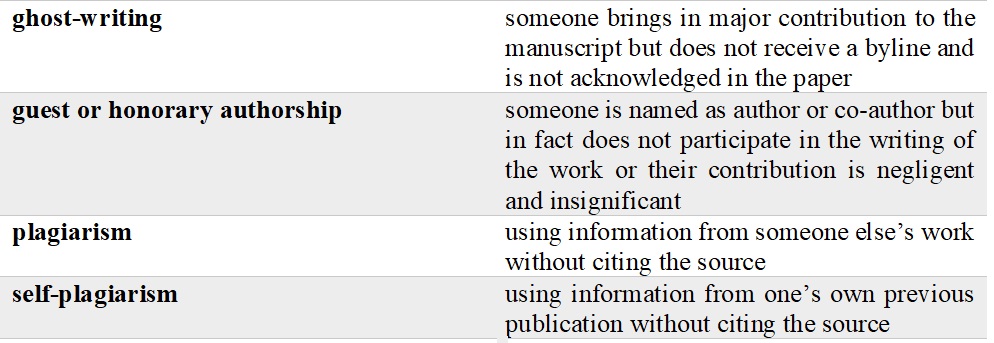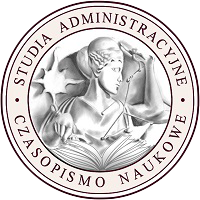In order to keep the high quality of published scientific texts, as well as support and promote scientific reliability, the Editorial Team of the magazine Studia Administracyjne applies ethical rules and procedures recommended by the COPE – Committee on Publication Ethics.
The magazine applies procedures regarding detection of scientific dishonesty which constitutes a gross infringement of standards and norms of scientific and academic integrity, threatening scientific reliability and independence of the author.
Committee of Publication Ethics (COPE)

COPE’s recommended procedures provide guidance on how to address the following cases: suspected redundant (duplicate) publication; suspected plagiarism; suspected fabrication of data; change in authorship; suspected ghost, guest or honorary authorship; if a reviewer suspects undisclosed conflict of interest (CoI) in a submitted manuscript; if a reader suspects undisclosed conflict of interest (CoI) in a published article; if an editor suspects an ethical problem with a submitted manuscript; suspicion that a reviewer has appropriated an author’s ideas or data.
Flowcharts presenting algorithms for procedures in cases of discovered dishonesty:
- in English: https://publicationethics.org/files/Full%20set%20of%20English%20flowcharts_9Nov2016.pdf
- in Polish: https://publicationethics.org/files/Full%20set%20of%20Polish%20flowcharts.pdf
Ethics for Authors
- Principle of originality - a submitted manuscript must be original (not published anywhere else before) and quote relevant references; the same manuscript cannot be submitted to two different journals at the same time; it must not be plagiarised, self-plagiarised or include false information;
- Principle of authorship - anyone who has provided major substantive contribution to the creation of a scholarly text (concept, implementation or interpretation of research) must be named as author; if such contribution is minor, the contributor must be named in acknowledgements and their role must be described; ghost and honorary authorship is inadmissible; in the case of multiple authors, the corresponding author must disclose the contribution of individual authors in the making of the manuscript;
- Principle of scientific reliability - including reliability in naming sources used in the research; if the author notices any errors or irregularities in the text they must notify the editors immediately and cooperate with the editorial team to remove or correct such an article; Authors must identify the sources of financing of their publication or contribution of the institution (organization) in the research (financial disclosure),
Principle of counteracting conflicts of interest - authors must identify real and potential conflicts of interests (financial and non-financial).
Ethics for Editors
- responsibility
∞ the editorial team must adhere to the adopted procedures of the publishing process, especially those relating to the review process (internal and external),
∞ the editorial team is responsible for exercising the principle of scientific reliability regardless of authors’ race, nationality, religion, gender or sexual orientation,
∞ the decision to publish a manuscript is based solely on its scientific value, regardless of authors’ race, nationality, religion, gender or sexual orientation,
∞ if any errors are detected, the editorial team, ensuring consistency of published material, publishes correction, errata and emendations,
∞ the editorial team may not in any way use a rejected manuscript without the author’s consent,
- confidentiality - all submitted manuscripts that have been accepted for publication undergo an anonymous review process
Ethics for Reviewers
- Objectivity and reliability of review - the evaluation of manuscripts must be substantiated and supported with reviewer’s own arguments; reviews must inform of suspected plagiarism or self-plagiarism,
- Keeping deadlines - a review must be submitted within the time limit set by the editorial team; if a reviewer is unable to provide a review, they must inform the editorial team of it as soon as possible,
- Confidentiality - reviews are drawn up anonymously, i.e. the author does not know reviewers’ surnames and reviewers do not know authors’ surnames (double-blind peer review),
- Counteracting conflicts of interest - a reviewer cannot review papers if there is a conflict of interest between them and the author resulting from working together or any other relations they may have with authors; reviewers must not use a rejected manuscript without author’s permission.






